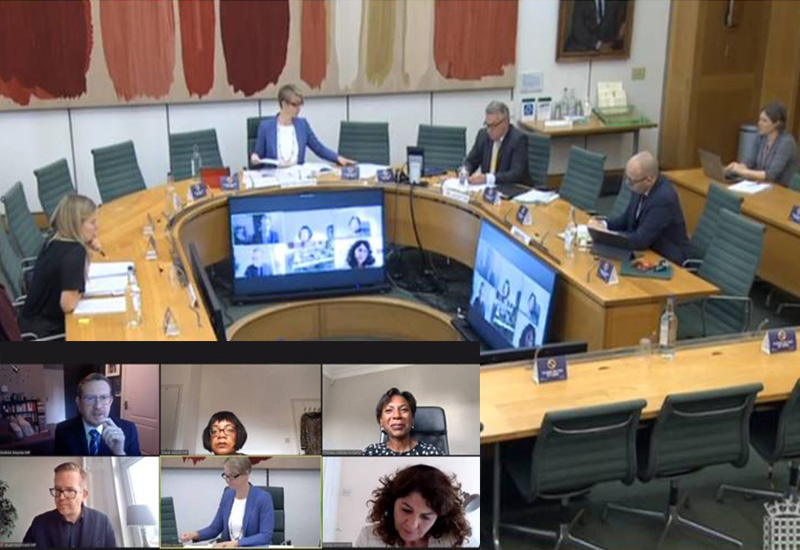By Debbie Ransome
Going beyond the basic storyline to dig deeper into the Haitian reality and how it gets reported, this

In the midst of squabbles over Covid-19 lockdown tiers and Brexit negotiations, a key independent review of how the UK should treat migrants in the light of the Windrush scandal has been laid before Parliament and reviewed by MPs.
In mid-October, the House of Commons Home Affairs Select Committee heard a briefing on the review of the Home Office contained in the Windrush Lessons Learned Review, prepared by a member of one of the UK’s criminal justice inspectorates, Wendy Williams. Ms Williams, officially known as belonging to Her Majesty’s Inspector of Constabulary, with a background as a solicitor and partner in a defence firm, is part of Her Majesty’s Crown Prosecution Service Inspectorate (HMCPSI), a watchdog unit. She was asked in 2018 to lead the Windrush review into the political scandal of the same name, involving people who were wrongly detained, denied legal rights, threatened with deportation and, in at least 83 cases, wrongly deported by the Home Office. The review was presented to Parliament in the summer of 2020 and progress scrutinised by the House of Commons home affairs committee in October.
The aim of the review was to “understand the key legislative, policy and operational decisions, and other factors that led to members of the Windrush generation becoming subject to measures designed for illegal immigrants”.
Outlining her findings, Ms Williams told the committee of her key recommendations on the need for cultural change at the Home Office from the top and for training for Home Office staff.
She described the recommendations in her report as a “once in a generational opportunity” for change.
“This is a telling, seminal moment for the department,” Ms Williams told the select committee.
“Dehumanising”
The 276-page review outlines what it called “dehumanising language” in the Home Office’s dealing with the public. Ms Williams said that the department needed to develop what should be effective engagement with people.
The review found that only 168 people of the Windrush generation had received compensation for being misclassified as illegal immigrants.
“The department [Home Office] has a choice. It can really embrace my recommendations or it can pay lip service to my recommendations, and not institute that fundamental cultural change,” Ms Williams told MPs.
There are 30 recommendations made in the review. Home Secretary Priti Patel has promised to implement all of them.
The recommendations call for improvements in community and stakeholder engagement, including the appointment of a migrants’ commissioner to speak up for those affected by the UK’s asylum and immigration system. Ms Williams said that the review had found “shocking” evidence of people being badly treated during the Windrush scandal and left bewildered by the system put in place to repair the damage.
The review follows numerous reports looking at how the UK became embroiled in the Windrush scandal in the first place. It includes case studies, stories of the Windrush generation and their children and looks beyond the Caribbean to provide lessons for the UK in its dealings with current and future migration.
The review stated: “The Windrush scandal was in part able to happen because of the public’s and officials’ poor understanding of Britain’s colonial history, the history of inward and outward migration, and the history of black Britons. A lack of institutional memory or comprehensive understanding of the impact of the complex immigration situation created by successive legislative changes, set against an unwillingness or inability to learn from past mistakes, or to engage with experts and local communities, has compounded this situation.
“Officials need to understand the past to inform the present and the future of immigration policy.”
Is the Home Office racist?
Wendy Williams wrote in the review: “I have concluded that race clearly played a part in what occurred, that some of the failings would be indicators of indirect discrimination if the department was not capable of establishing objective justification and that the department should therefore consider whether such justification exists and be alive to the risk of indirect discrimination.
“In relation to institutional racism, while I have not found on the evidence I have reviewed that the organisational failings within the department satisfy the Macpherson definition in full, I nonetheless have serious concerns that the factors that I identified demonstrate an institutional ignorance and thoughtlessness towards the issue of race and the history of the Windrush generation.”
Ahead of the October sitting of the home affairs select committee, Home Secretary Priti Patel promised what she called a cultural shift and root-and-branch reform in her department in response to the review. However, at the review presentation before the select committee, Ms Williams and MPs looking into the findings questioned why key parts of the recommendations, particularly the appointment of a migrants’ commissioner, had not yet appeared on the Home Office agenda.
A week after the select committee met, the watchdog unit warned the Home Office publicly about carefully choosing the language it uses when talking about migration. The warning followed Home Office comments about “activist lawyers”. Ms Williams said that the Home Office needed to use neutral language when talking about migration.
Wendy Williams is due to return to inspect the Home Office in 2021. She told MPs that she hoped that key parts of the review’s recommendations would have been put in place by then.
To read the case studies and the entire review, follow this link.
By Debbie Ransome
Going beyond the basic storyline to dig deeper into the Haitian reality and how it gets reported, this
[photo: Patti Smith & Winston Rodney, cred Ted Bafaloukos]
In a year of global challenges and fall-out, we at Caribbean Intelligence© have focused on the aspirational side of Caribbean life.